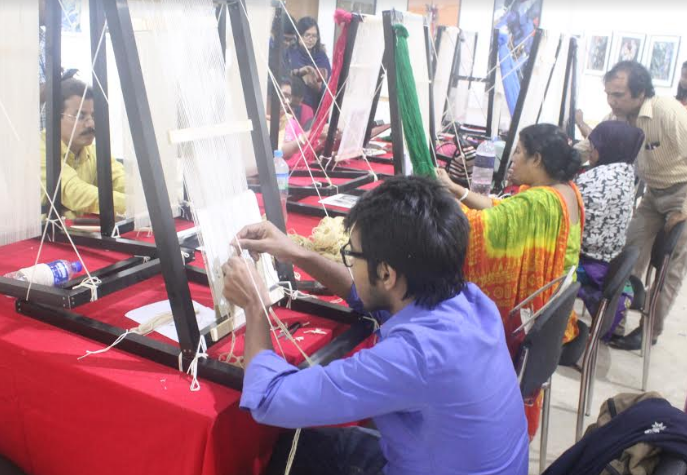#Economic Slowdown: Tirupur Garment Industry Gasps for Survival

The garment industry in Tirupur district of Tamil Nadu is gasping hard to survive the economic crisis resulting in heavy job losses and reduction in manufacturing. Tirupur city, known as the knitwear capital of India or baniyan city, is slowly losing its export base in the international market and the domestic market. The struggle is getting worse owing the lack of support and attention from the government of India and Tamil Nadu.
Migrant labour and workers from other parts of Tamil Nadu are returning to their hometowns due to lack of jobs.
WORKERS LEAVING THE CITY EN-MASSE
The garment industry provides jobs for several lakhs of workers. The exact number is not available, since most of them are migrants from other states and other places of Tamil Nadu. Since the exact number is not known even to the state government, which does not have a concrete policy on migrant labour, the exact number of job losses is also hard to be predicted exactly. But, as per the statement by the workers and trade union leaders, more than 50% of these 10 lakhs jobs have been lost.
Sampath, the general secretary of the Baniyan and General Workers Union of the Centre of Indian Trade Unions (CITU), while speaking with NewsClick, said, “The bi-weekly express from Ernakulam junction to Patna is flooded with thousands of workers leaving the town due to loss of jobs. I went to the station this Sunday to witness this pathetic state of workers who are finding it hard to survive in a city that gave jobs to lakhs of workers”.
BACK TO SAHEBPUR KAMAL
Vinod, a resident of Sahebpur Kamal in Begusarai district of Bihar, is one among the workers who have left Tirupur. He was working in the banian city for the past nine years and says he has never witnessed such a situation.
Speaking with NewsClick, Vinod said, “I was working there for the past nine years and for the last three years, I employed around 70 people for contract works. Now that there are no jobs, and I, along with many others are returning home. Only 10 people are staying back in Tirupur to complete the works we have committed to finish”.
Highlighting the future insecurity that the workers face, Vinod said: “We were forced to spend money from our savings for our daily needs since there has been no regular work for the past six months or so. We could not deplete our savings anymore and hence we decided to go back to our hometown. Now our families are upset and fear that we may not get back our jobs”.
SITUATION WORSE THAN EXPECTED
The economic slowdown has focussed more on the automobile industry, while the garment industry has not received the deserved attention. The government is also inclined to announce tax relaxations for big industries and is unmindful of the huge number of small and medium industries in the textile manufacturing sector.
“The garment industry’s struggle started with the announcement of demonetisation three years ago. Many of the transactions were done in cash, since a lot of job works are involved in manufacturing a finished good. When the industry was recovering from that crisis, the Narendra Modi government announced the implementation of the Goods and Services Tax (GST). The small and medium companies were severely affected by the complex process of tax filing and hence the business was also affected,” added Sampath.
IMPORT POLICIES CRUSH LOCAL INDUSTRIES
Competition faced by exporters from countries like Bangladesh, Cambodia and Indonesia is also hitting the industries of Tirupur. Imports from these countries, particularly from Bangladesh, are crippling the industry. As per the report of Confederation of Textile Industry (CITI), garment exports from Bangladesh increased by 56% after the implementation of GST in India during July-November 2017.
The president of Tirupur Exporters and Manufacturers Association (TEAMA), Muthurethinam, told NewsClick that, “There is a reduction of about 60% in exports and 80% in domestic sales. About 85% of the industries in Tirupur are small and medium ones, which have been the most affected due to government policies. The Union government’s policy of exempting tax for garment import from Bangladesh is also playing a role in crushing the industry. The companies that procure the garments are happy to purchase cheap goods from Bangladesh resulting in fewer orders for local companies.”
Elaborating on the sorry plight of small and medium units, especially due to declining exports, Muthurethinam said: “The Indian market is one of the biggest in the world with huge manpower and machineries available. But, unfortunately, the local manufacturers are finding it hard to sell their products. On the other side, the relaxation for exports has been withdrawn by the Union government. If this continues, it will be hard for the small and medium industries to survive, paving way for the big corporates to dominate the market”.
SALES DOWN IN FESTIVAL SEASON
The festival season in the state starts in October with Pooja celebrations, followed by Diwali and Christmas and extends up to Pongal in January. But the markets are yet to see any rise in demand for garments. At this time every year, Tirupur usually hums with activity with massive manufacturing for the season, which is so far not visible.
As in indication, Muthurethinam points out that, “Roadside sellers are one of the biggest purchasers, but we have not seen anyone coming to purchase goods so far. One of the biggest markets of the state in Erode is also facing a severe problem with no sales taking place there too.”
The worst hit by the economic slump are workers, mostly those on contract.
“The government is not considering the plight of several lakhs of garment workers in the district, but we are hearing of several tax, relaxations for the corporates, announced by the finance minister. But, how will these announcements increase the purchasing power of the common man?” asks Sampath.
‘TO LET’ BOARDS IN MANUFACTURING COMPANIES
It is unfortunate that companies that once gave jobs to whoever knocked the doors, have started pasting ‘to let’ bills on walls. Doing business in Tirupur has become a challenging task for the small and medium companies in the face of government apathy. The city, which once contributed 90% to knitted garments for exports, is searching for a market to sell its product.
Many of the representations made to the state and Union governments to save the industry from further collapse have not been heeded. The highly unorganised and migrant nature of workers, coupled with the pro-government attitude of few influential exporters and manufacturers, have muzzled the voice of the industry.
Get the latest reports & analysis with people's perspective on Protests, movements & deep analytical videos, discussions of the current affairs in your Telegram app. Subscribe to NewsClick's Telegram channel & get Real-Time updates on stories, as they get published on our website.
























